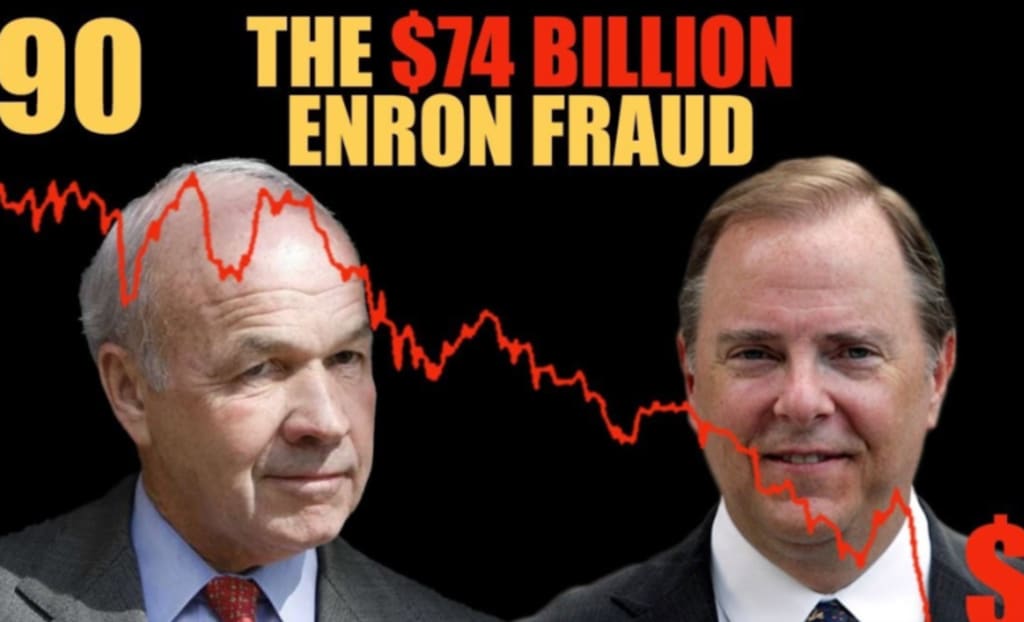The Enron Scandal: Corporate Deception, Catastrophic Collapse, and the Path to Reform
The meteoric rise of Enron, once celebrated as a beacon of innovation and success, quickly turned into a cautionary tale of corporate deception and greed. Founded in 1985, the company's rapid expansion and groundbreaking ventures masked a dark underbelly of fraudulent accounting practices and financial manipulation. When the truth emerged, it led to one of the largest bankruptcies in U.S. history, devastating employees, investors, and the wider financial community. However, the ensuing fallout also spurred significant regulatory reforms, exemplifying the resilience of the legal and financial systems in restoring trust and accountability.

The Enron scandal remains one of the most infamous cases of corporate fraud in history, symbolizing the dark side of American corporate culture. At its height, Enron was one of the largest energy companies in the world, celebrated for its innovation and growth. However, behind its facade of success lay a web of deceit and corruption that ultimately led to its dramatic downfall. This story is not only a cautionary tale of corporate greed but also a testament to the resilience and reform that followed in its wake.
The Rise of Enron
Enron was founded in 1985 by Kenneth Lay through the merger of Houston Natural Gas and InterNorth. Initially, Enron focused on energy trading and utilities, but under Lay's leadership, the company began to innovate aggressively. By the 1990s, Enron had transformed into a global energy giant, pioneering new markets in energy trading, broadband services, and international ventures.
Enron's growth was meteoric. It was named "America's Most Innovative Company" by Fortune magazine for six consecutive years. The company's stock price soared, making it a darling of Wall Street. At its peak, Enron employed over 20,000 people and reported revenues of over $100 billion in 2000.
The House of Cards
Behind the scenes, Enron's success was built on a foundation of fraudulent accounting practices and deceptive financial reporting. The company's executives, including CEO Jeffrey Skilling and CFO Andrew Fastow, orchestrated a scheme to hide debt and inflate profits through the use of complex accounting loopholes and special purpose entities (SPEs).
These SPEs allowed Enron to move debt off its balance sheet, making the company appear far more financially robust than it actually was. Additionally, Enron engaged in mark-to-market accounting, which allowed them to book potential future profits as current income. This practice created an illusion of constant profitability and growth.
As Enron's true financial situation began to unravel, whistleblowers within the company, like Sherron Watkins, and investigative journalists started to uncover the discrepancies. By the time the truth emerged, it was clear that Enron was on the brink of collapse.
The Collapse
In October 2001, Enron announced that it was restating its earnings for the previous five years, effectively admitting that it had inflated profits by nearly $600 million. This revelation triggered a series of events that led to the company's bankruptcy.
The Securities and Exchange Commission (SEC) launched an investigation, and Enron's stock price plummeted from over $90 to less than $1 within weeks. On December 2, 2001, Enron filed for Chapter 11 bankruptcy, marking the largest bankruptcy in U.S. history at the time.
The fallout was immense. Thousands of employees lost their jobs and life savings, investors lost billions of dollars, and the credibility of corporate governance in America was severely damaged. The Enron scandal became a symbol of corporate malfeasance and the need for significant regulatory reform.
The Pursuit of Justice
The aftermath of Enron's collapse saw a determined pursuit of justice. Kenneth Lay, Jeffrey Skilling, and Andrew Fastow were all indicted on various charges, including fraud, insider trading, and conspiracy. Fastow, who played a central role in the fraudulent schemes, cooperated with prosecutors and received a six-year prison sentence.
Jeffrey Skilling was convicted in 2006 on 19 counts of conspiracy, fraud, and insider trading. He was sentenced to 24 years in prison, though his sentence was later reduced. Kenneth Lay was also found guilty, but he died of a heart attack before he could be sentenced.
The Enron scandal led to the dissolution of Arthur Andersen, one of the "Big Five" accounting firms, which was found guilty of obstructing justice by shredding Enron-related documents. The firm’s conviction was later overturned, but the damage to its reputation was irreparable, leading to its collapse.
Resilience and Reform
The Enron scandal prompted significant changes in corporate governance and regulatory oversight. In 2002, the U.S. Congress passed the Sarbanes-Oxley Act (SOX), which aimed to enhance corporate transparency and accountability. SOX introduced stricter regulations on financial reporting, internal controls, and the responsibilities of corporate executives.
One of the key provisions of SOX was the establishment of the Public Company Accounting Oversight Board (PCAOB) to oversee the audits of public companies, ensuring the accuracy and reliability of financial statements. The act also increased the penalties for corporate fraud and required CEOs and CFOs to personally certify the accuracy of financial reports.
The Legacy of Enron
The Enron scandal serves as a powerful reminder of the consequences of unchecked corporate greed and the importance of ethical business practices. It exposed the vulnerabilities in the financial system and the need for robust regulatory frameworks to protect investors and the public.
Despite the devastating impact of the scandal, the reforms that followed have helped to restore confidence in corporate governance. The resilience of the regulatory system and the determination of those who sought justice ensured that the lessons of Enron would not be forgotten.
To conlude, the story of Enron is a tale of ambition and innovation that descended into fraud and deception. It highlights the dangers of prioritizing profit over integrity and the catastrophic consequences that can ensue. However, it is also a story of resilience and reform, showcasing the ability of the system to adapt and overcome in the face of adversity. The Enron scandal remains a pivotal chapter in corporate history, underscoring the need for vigilance, transparency, and accountability in the world of business.
About the Creator
Jane Doe
As a passionate storyteller, I captivate readers with engaging, well-researched articles across genres from criminality and poems to lifestyle and more....
Join me for insights, tips, and narratives that inform and entertain.






Comments
There are no comments for this story
Be the first to respond and start the conversation.